The unknown winners of Mexico’s energy reform
An investigation by EL PAÍS reveals how an obscure US company, just months after being created, began winning multimillion-dollar contracts from a subsidiary of Mexico’s Federal Electricity Commission (CFE) soon after the opening of the country’s electricity sector. The ties between Guillermo Turrent, a key executive during the Enrique Peña Nieto administration, and the founders of Whitewater Midstream, tell the story of a pursuit of profits in recently liberalized energy markets
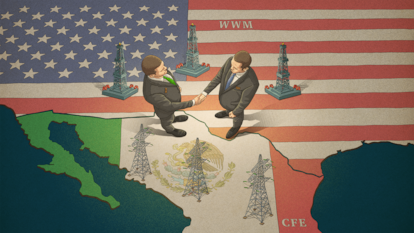
It was a perfect opportunity. When Mexico opened its market to allow private companies to produce and sell energy for the first time in decades, two US executives suddenly found themselves in a privileged position. Mexico would be buying significant amounts of natural gas from its northern neighbor and the person in charge of negotiating the contracts was someone they knew well: an ex-colleague from more than 15 years earlier, with whom they’d worked with in another recently liberalized market.
An investigation by EL PAÍS, with information from more than 80 interviews with members of the energy sector, confidential sources and the review of more than 5,000 internal emails from Mexico’s Federal Electricity Commission (CFE) obtained through the National Transparency Institute (INAI), reveal the ties between the executives of CFEI – the international branch of CFE, created after the country’s energy reform – and Whitewater Midstream, an obscure US company that won multimillion-dollar contracts from the Mexican government under the direction of Guillermo Turrent, ex CEO of CFE International during the government of former Mexican president Enrique Peña Nieto.
It’s the story of a group of traders who went from generating large profits in California’s liberalized energy market to another that had just opened up – Mexico – 15 years later. In California, their names and ties appear in documents that are part of an open case against the company where they worked for possible overcharges to the state.
In Mexico, they are now being targeted by the government, CFE spokesperson Luis Bravo Navarro told EL PAÍS on July 5, in response to a question about Whitewater. “With this company (Whitewater), what we are going to do is take legal action, both civil and criminal,” said Bravo Navarro. “We will be complying with the obligation to denounce acts and incidents of an illegal nature that are detrimental to Mexico.”
The energy reform of former president Enrique Peña Nieto made the US company Whitewater Midstream, founded in 2016, a big winner of multimillion-dollar contracts. Just five months after its creation, the company had already struck a first deal with the CFE and, in just a few years, went from an unknown entity in the energy sector to a competitor of the industry’s biggest international players. Emails and confidential documents obtained by EL PAÍS show that the company negotiated at least two contracts with CFE International (CFEI). One of the contracts, in which Whitewater committed to supply a large volume of natural gas – between 15 to 20% of Mexico’s daily import demand, an amount that shocked experts in the industry – was won in association with one of the largest energy companies in North America, according to an internal document leaked to EL PAÍS.

The contracts were awarded under Guillermo Turrent, ex director of CFEI, who had worked with a high-ranking executive and the founder of Whitewater at Royal Dutch Shell in San Diego, California during 2000 and 2001. Details of their employment and behavior while at Shell is documented by the Federal Energy Regulatory Commission (FERC), where a case remains open that examines the company’s purported overcharging of the state of California for electricity in the negotiation of a long-term contract. During that time, just a year after opening its market to private competition, California suffered an electricity crisis that included widespread blackouts that affected millions of residents and caused record price increases for power that almost bankrupted the state government.
“Abusive contracts”
Since the beginning of his administration, Mexican president Andrés Manuel López Obrador has decried the energy reform, arguing that the contracts awarded after the market liberalization favor private companies and are detrimental to the country. In 2019, Manuel Bartlett, the CEO of the CFE, renegotiated natural gas supply contracts signed during the previous administration of Peña Nieto that were described as “abusive” and included terms unfavorable to Mexico, though neither he nor the president have yet mentioned the deals with Whitewater. In the almost three years that López Obrador has been in office, information about the relationship between CFEI and Whitewater Midstream is yet to be discussed publicly, despite the possible conflicts of interest that exist between their executives, who have known one other for more than 20 years.
Dozens of information requests made between 2019 and 2021 through the National Transparency Institute (INAI), as well as directly with the CFE, to learn the public details of the Whitewater contracts were rejected under the argument that they are confidential. However, according to the CFE spokesperson, the state company will soon discuss the contracts with Whitewater publicly. “This has to do with zero tolerance for corruption,” said Bravo Navarro. “What we are doing is defending the interests of the CFE, defending the interests of Mexicans and, for that reason, legal action is being taken.”
At the beginning of the energy reform, the CFE founded a private company based in Houston, Texas and constituted in the state of Delaware, which enjoys confidential protection of its contracts. It was called CFE International (CFEI) and is known in Mexico as CFEnergía. The US is the world’s principal producer of natural gas, which it sells at the lowest prices in the international market. The role of CFEI within the group of companies that form the CFE is, precisely, to take advantage of the proximity to the US to negotiate contracts for the purchase and sale of the fuel at the best available prices, given that the gas is used in Mexico to generate electricity. To accomplish that, CFEI needs to enjoy a certain confidentiality, which is standard for any private firm that competes in the market and negotiates contracts with other companies. Revealing the prices negotiated for the purchase and sale of natural gas would make the company vulnerable to competition.
The creation of a private branch of a state company such as CFEI was an important part of the opening of the electricity market in Mexico, explained Adrián Duhalt, fellow in Mexico Energy Studies at Rice University’s Baker Institute for Public Policy. “It can be used as an instrument to boost the presence of the state companies abroad,” he said.
CFEI, in contrast to its parent company CFE or the state-owned oil company Petróleos Mexicanos, isn’t obligated by law to publish information about its agreements or the business it conducts. In other words, it acts as a kind of black box where its internal operations are protected. “This allows government officials to take advantage of this legal loophole that doesn’t apply to the state-run companies,” said Duhalt. Thus, CFEI isn’t required to disclose its operations publicly and its dealings with private companies depend solely on the good faith and trustworthiness of the officials in charge.

Return to Mexico
Guillermo Turrent made an announcement on Facebook in January 2013. “I’m happy to let you know that today I officially started as Director of Modernization at CFE (the electric utility of Mexico),” he wrote alongside a new profile photo in which he wore an impeccable black suit and tie. “It’s been 16 years since I left and I’m happy to come back.”
Francisco Rojas, the father of one of his childhood friends, had been made CEO of the CFE under the new administration of Peña Nieto, who took office in December 2012. Rojas named Turrent Director of Modernization and his job was to lead the design of a new network of natural gas pipelines that would supply the country with the cheapest natural gas in the world, which is sold in Texas.
It’s not that Turrent was not qualified for the role. A graduate of Mexico’s National Autonomous University (UNAM), he had moved to the US to work in the energy sector early in his career. There, he worked at international companies such as Shell, Sempra Energy, Constellation Energy and EDF. Members of Mexico’s nascent energy sector met Turrent’s arrival with enthusiasm and, to date, people that worked closely with him describe him as “brilliant” and as a tireless worker who often dressed in Ferragamo suits.
It was also an exciting moment for the Mexican energy sector. Congress passed the constitutional energy reform that same year, 2013, allowing private companies to invest in oil and electricity generation for the first time in more than 70 years. For the CFE, this meant a reorganization that divided the parent company into several smaller subsidiaries, among them CFEI, where Turrent was later named its first CEO in 2015.
In April 2016, Matthew Calhoun, an ex-colleague of Turrent’s at Shell in California during 2000-2001, founded Whitewater Midstream in Austin, Texas. By September, Whitewater had already negotiated its first deal with CFE for the development of an “important project” together, according to internal emails obtained by EL PAÍS. Around the same time, Arlin Travis, another ex-colleague of Turrent and Calhoun at Shell, was hired to work with the CFE as an independent consultant. A year later, Travis was working at Whitewater.
California crisis
Turrent, Travis and Calhoun have known each other for decades. The three were colleagues at Shell in San Diego during a time known as the California electricity crisis, which took place in 2000-2001. In the late 1990s, California, similar to what Mexico did years later, deregulated its electricity market to promote competition among private companies and theoretically lower power costs for residents. But the opposite happened.
In 2000 and 2001, electricity prices rose to their highest levels in California’s history. As a result, the state was unable to afford to purchase power, which left millions of citizens without electricity in cities such as San Diego and San Francisco and generated billions of dollars in losses for California. In search of stable prices and a reliable electricity supply, the state brokered long-term contracts with companies to protect citizens from further power outages and unpredictable rates. California signed one of these long-term electricity contracts with Shell, where Turrent, Travis and Calhoun were working at the time.
But in late 2001, Enron Corp, which sold power in California’s electricity market, went bankrupt. Its collapse sparked a broad investigation by authorities in the US which found that Enron, along with more than 30 private companies including Shell and Sempra Energy, had participated in manipulative schemes to inflate the state’s electricity prices, causing the energy crisis. This revelation led California to argue that the rates negotiated for long-term contracts during the crisis in 2001, which were brokered to avoid erratic and exorbitant prices, were also unjustifiably high. California thus presented a complaint to the Federal Energy Regulatory Commission (FERC) and argues, to date, that Shell took advantage of the market irregularities and artificially elevated prices to establish inflated rates in the long-term electricity contract, constituting fraud in the formation of the deal.
The FERC is yet to make a final determination in the case of the long-term contract signed between California and Shell. In 2016, an administrative law judge at the FERC recommended that Shell pay $779 million dollars to the state of California for overcharges related to the contract. Commissioners at the FERC, however, are yet to issue a final ruling on the case, which remains open.
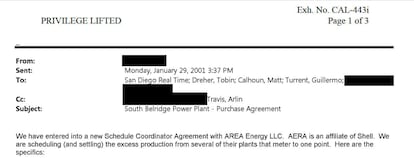
Turrent, Travis and Calhoun weren’t accused of electricity price manipulation nor fined in the case. However, their names and comments appear in emails and transcripts of recorded phone conversations between Shell employees, which were submitted as evidence in the case. The correspondence shows the three men knew one another, worked together and that their behavior as employees at Shell raises questions about their behavior as energy traders. “The audio tape recordings and emails of Shell trader conversations that have been admitted in evidence are replete with references to the traders’ knowledge of unlawful activities and how profitable they were,” wrote the administrative law judge in his initial decision presented to the FERC in 2016.
Perhaps one of the most inflammatory comments that appears in the case was made by Shell employee Tobin Dreher, who, according to a phone conversation transcript, compared the ease at which the company made profits off of California to taking “candy from a baby.” Dreher was hired by Turrent in 2018 to work at CFEI as Vice President of natural gas trading and financial hedging, a position he left this year, according to an announcement on social media. Another comment that appears within the thousands of pages of testimony and transcripts presented as evidence was made by Turrent’s boss at the time, who celebrated the millions of dollars the company had made as citizens suffered power outages. An ex-Shell trader asked Turrent’s boss the following question: “Purely on an ethical basis, do you have any problem with rolling blackouts?” “On an ethical basis? No,” she responded.
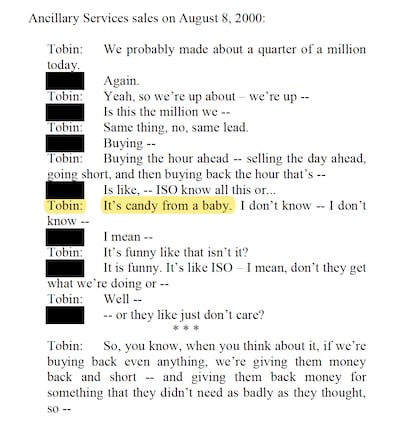
Turrent’s name appears three times in the initial decision by the judge, who argues that as a negotiator of Shell’s long-term contract, he and members of his team were aware of the inflated market prices when negotiating the deal with the state of California. A Shell spokesperson denied wrongdoing in an emailed response to EL PAÍS and said the electricity contracts in question were brokered “in compliance with the existing regulations” at the time. “Our position is that the administrative law judge’s initial decision should be overturned and we hope the commissioners’ eventual ruling does that,” said the spokesperson.
Reunited in Mexico
Turrent, Travis and Calhoun took different paths after their time at Shell and the California electricity crisis, working for different companies in other regions of the US. But years later, the three reunited to work together in another recently deregulated market: Mexico.
In July 2016, Travis was hired as a consultant for the CFE, according to emails obtained by EL PAÍS and exchanged between him, Turrent and Javier Gutiérrez, the ex Chief Operating Officer at CFEI. Two months later, in September 2016, Gutiérrez, Travis and an executive of Whitewater met in Texas to discuss business opportunities, according to a CFE public document. Days later, the CEO of Whitewater sent an email to Gutiérrez in which he expressed satisfaction with the agreements negotiated between the Texas company and CFE.
It was Gutiérrez, who worked directly with Turrent, who met with members of the Whitewater team on at least four occasions during the final months of 2016, according to public CFE documents. One public document explains that Gutiérrez “held a meeting with the company Whitewater to negotiate an interconnection contract” at a natural gas header in west Texas.
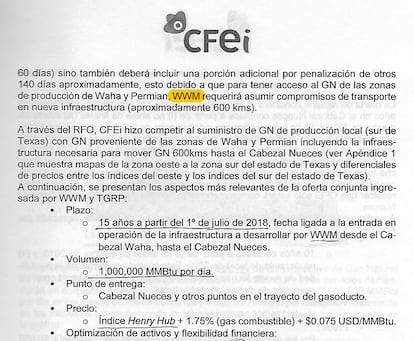
Turrent’s links to Whitewater go beyond his relationships with former Shell colleagues now employed by the company. One employee of Whitewater, Todd Speiser, was Turrent’s colleague at Constellation Energy and later EDF, where they worked on the same team. In the first months of 2017, Whitewater employees began working inside of the CFE offices in Mexico City as “consultants,” according to three internal CFE sources. The sources say that the presence of the Whitewater employees inside the offices was viewed as unusual and a possible conflict of interest, given that the Texas company later won a contract prepared during the time they worked inside the CFE as consultants.
According to one of the three internal sources, Speiser and other Whitewater employees began working within the offices of CFEI in Mexico in February of 2017 and continued work there in the months that CFEI prepared an auction for a contract that would supply Mexico with a large volume of natural gas. The auction, known as a request for offer (RFO), was published in June and, in November, CFEI announced that the winner of the contract was Whitewater Midstream, in association with another company. The sources consider that it is possible that Whitewater, during its time working within the CFE offices, had access to privileged information that gave them an advantage over competitors that participated in the RFO.
The massive contract awarded to Whitewater in association with another company is for the supply of a quantity of natural gas equivalent to 15-20% of the daily import demand of Mexico for 15 years, according to an internal document that details the terms of the contract as they were approved by the CFEI board of directors.
The enormous natural gas volume to be supplied as part of the contract caught the attention of members of the energy sector on both sides of the border, including experts interviewed by EL PAÍS who say they don’t know of another deal of comparable size in the industry. For that volume of natural gas, CFEI estimated that it would pay around $3 million per day for its delivery, according to the internal document. Additionally, a month later, in December 2017, the board of directors at the CFE approved a parent company guarantee to Whitewater for an amount of up to $600 million for a period of 15 years, according to a public document. A parent company guarantee is common in contracts between companies, as it assures that the guarantor will comply with a minimum payment commitment established in the agreement.
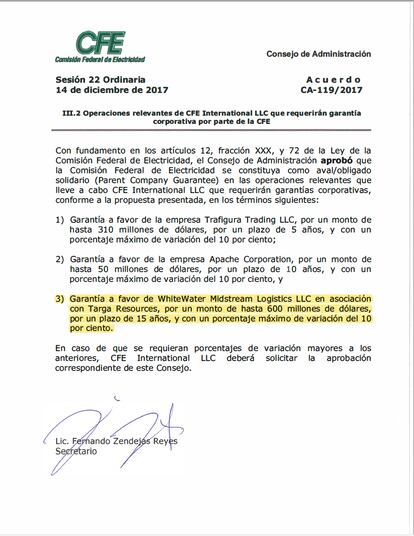
The renegotiation of contracts such as Whitewater’s could be expensive for Mexico. On July 15, the credit rating agency S&P Global said in a press statement that it could cut Mexico’s sovereign debt rating in the next year if the economic performance of the country is weakened by “setbacks in some policies and the renegotiation of established contracts, particularly in the energy sector.” If Mexico loses its coveted investment grade rating, it would drive up interest rates that investors charge in return for loaning money to the government.
Turrent didn’t respond to several requests for comment from EL PAÍS. Tobin Dreher, who left his position at CFEI in March, as well as Javier Gutiérrez, who left the CFE following the conclusion of Peña Nieto’s administration, didn’t offer comment for this story. Calhoun, Travis and Speiser also declined to comment through a public relations agency.
“It’s very interesting to learn where all these folks have landed and that they are still out there in the industry,” said Gerald A. Taylor, an expert witness for California in the case against Shell. “More than a little surprising given their behavior in the California electricity markets.”
And while the Mexican government hasn’t commented publicly on the relationship between Whitewater and the CFE, in February a Mexican congressman for the ruling Morena party, Iván Arturo Pérez Negrón, said before the energy committee of the Chamber of Deputies that Whitewater is “a company that was awarded contracts whose financial damage, because it had neither assets nor a financial history, is for more than $22 billion dollars, (including) gas and natural gas pipeline contracts given to a company without financial solvency, under the suspicion of corruption, influence peddling and misuse of privileged information.”
This is an investigation completed by EL PAÍS and CONNECTAS with the support of the International Center for Journalists (ICFJ) as part of the Investigative Journalism Initiative in the Americas.